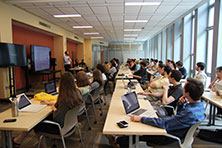Advancing Technology Education at CMU and Beyond
 Digital Humanities Literacy Workshop
Digital Humanities Literacy Workshop
Approaches to teaching and learning in higher education are changing faster than ever before – and technology is playing a major role in this process.
Recently, Carnegie Mellon offered the inaugural Digital Humanities Literacy Workshop and a Technology-Enhanced Learning Summer School, both made possible by a five-year $2 million grant from the Andrew W. Mellon Foundation.
At the Digital Humanities Literacy Workshop, one presenter – Chris Warren, an assistant professor of English, asked workshop participants to examine William Shakespeare’s corpus using Voyant, a web-based reading and analysis tool for digital texts.
Warren’s presentation to about 60 Ph.D. students and faculty along with a few participants from local universities focused on digital literacy studies. He and other Carnegie Mellon faculty presented, as well as professors from the University of Pittsburgh and Duquesne University.
“These days, almost all work in the humanities could be described as digital in some way or another,” said Warren. “Faculty and Ph.D. students regularly use digital tools, create digital materials, assess digital scholarship, and study digital culture, but until now, we’ve had few chances to develop digital humanities literacy. This workshop gives CMU humanists critical new vocabularies with which to ask and answer the questions that matter to us.”
Scott Weingart, the university’s digital humanities (DH) specialist, led the intensive one-week course that covered the theory and practice of digital humanities.
“The workshop is important as part of a strategic goal of the university and the college to ensure the technological literacy of graduate students and to offer graduate students interested in digital humanities pathways to building solid research foundations in this area,” said Weingart.
Graduate students could take the workshop as part of their student training and collaborated in small groups to produce a DH project proposal.
The following week, CMU hosted a Technology-Enhanced Learning (TEL) Summer School, a four-day course designed to prepare participants in the humanities to make effective design decisions around educational technology – from selecting appropriate tools to incorporating them effectively in a given teaching/learning context.
Interactive workshops showed participants how to analyze the match between an educational technology and their teaching/learning needs, resources, and constraints. They also walked away with learning how to design instructional activities and assessments that leverage the affordances of the technology. The course attracted about 40 Ph.D. students from the humanities and a few faculty members.
The Eberly Center for Teaching Excellence & Educational Innovation organized the TEL summer school to fulfill the goals of the Mellon Foundation grant and to continue their work in collaborating with faculty and graduate students to design and implement meaningful educational experiences.
“The Eberly Center regularly offers seminars for graduate students on a variety of issues related to teaching and learning,” said Marsha Lovett, the center’s director. “These seminars combine research on learning with best teaching practices and regularly include educational technology applications. The TEL summer course is essentially a mini-series of these seminars, but with a TEL and humanities focus.”
Various Eberly Center consultants, including Lovett, led the interactive workshop. In addition, several CMU humanities faculty members presented TEL projects they are pursuing.
Chris Neuwirth, professor and head of the English Department, presented her TEL project, Prose Style. The online module teaches students how to write in a verb-based style. It was built on Carnegie Mellon’s Open Learning Initiative (OLI), an online platform for courses that’s open to anyone who wants to learn or teach.
“OLI provides a wonderful way to do data-driven assessment,” said Neuwirth.
Other faculty presentations focused on topics ranging from Associate History Professor Nico Slate’s socialchange101.org, a free online educational resource and youth workshop series to a presentation on Chinese courses built within the OLI by Sue-mei Wu, a teaching professor of Chinese Studies.
“The workshop introduced students to a range of TEL possibilities for their own teaching and gave them a sense of what kinds of projects they might do if they want to do work in a certain area,” said Neuwirth.
The workshops are examples of how CMU harnesses a cross-disciplinary ecosystem of learning science, a hallmark of the university’s Simon Initiative. Named for Herbert Simon, the late CMU Nobel Laureate, professor and co-founder of artificial intelligence, the Simon Initiative’s goal is to measurably improve student learning outcomes.
The English Department has many DH and TEL projects underway:
- Classroom Salon, a document and video annotation system, now has 25,000 users worldwide. Salon aggregates annotations and can provide insights into student thinking. David Kaufer, professor of English and Ananda Gunawardena, professor of computer science, built Salon.
- This month, a beta version of the Six Degrees of Francis Bacon project launched. Led by Chris Warren, assistant professor of English, the project reassembles the early modern social network in Britain between 1500-1700.
- Ubiqu+lty 1.0, a text visualization application from the University of Wisconsin-Madison now uses the DocuScope dictionary – exposing the tool to worldwide users. DocuScope is software for rhetorical text analysis developed by Kaufer and Suguru Ishizaki, associate professor of English.
Related Articles:
Scott Weingart Joins Carnegie Mellon As Digital Humanities Specialist
CMU's assistant professor of English, Chris Warren, discusses digital literacy studies at the inaugural Digital Humanities Literacy Workshop.
___
By: Amanda King